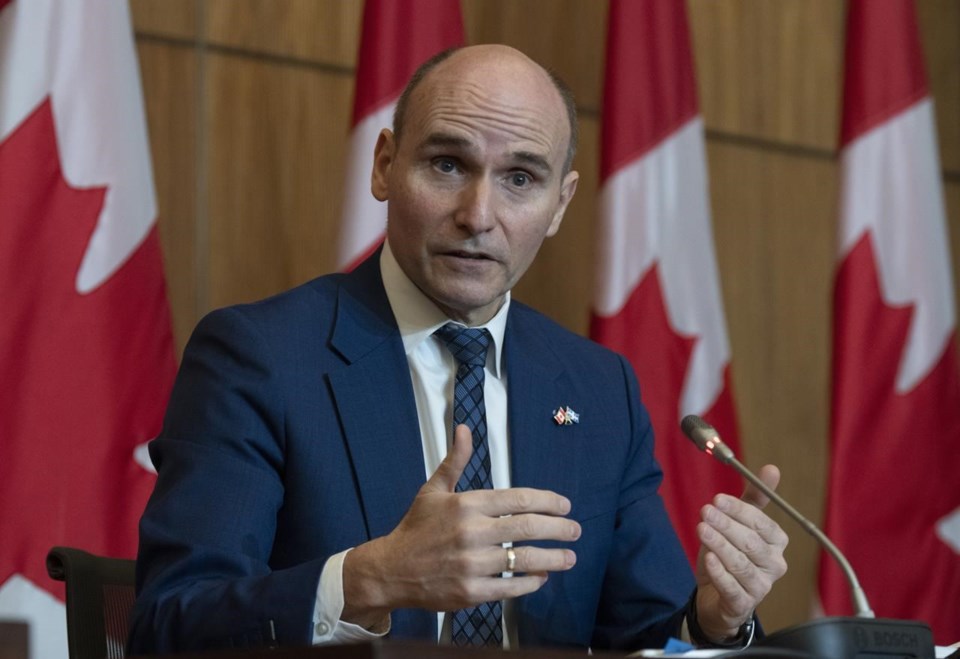OTTAWA — Provinces that continue to allow private clinics to charge patients directly for virtual health care could see their future federal funding clawed back, as the government moved Friday to put an end to a proliferation of for-profit virtual care in Canada.
Health Minister Jean-Yves Duclos said he intends to clarify that virtual care is covered by the Canada Health Act, the same way the federal government clarified in 2018 that it applied to all medically necessary diagnostic tests.
That latter point led Duclos Friday to claw back health transfers to seven provinces for allowing private clinics to charge patients directly for MRIs, CT scans and other tests.
He said the move is mandatory under the Canada Health Act. And he warned the same thing could happen in the future if provinces don't tackle fee-for-service in virtual care for services that would be paid for through the public health system if they were provided in person by a doctor.
"It is critical that access to medically necessary services, whether provided in person or virtually, remains based on medical need and free of charge," said Duclos.
Duclos said virtual care grew from about three per cent of health services in Canada before COVID-19 to about 18 per cent now. He called that a positive development, but said it cannot be used to allow more user fees in the health care system.
Dr. Brett Belchetz, the CEO of Maple, an online medical clinic, said he thinks the federal government is opening a legal can of worms.
He said Canadian law has been clear that fees can be charged for services that aren't medically necessary and that provinces get to determine what that applies to. If provinces won't start paying for virtual visits, he said he doesn't think Ottawa can prevent patients from paying for it themselves.
"I'm very confused about what the announcement actually means," he said.
"Because I cannot see any legal rule in which the government can now say that they will have services that they do not cover, but yet Canadians do not have the right to pay for themselves."
Clawbacks to federal transfers over private billing are not new. Between 2015 and 2022, an average of $15 million a year was clawed back from provinces for user fees charged by private surgical clinics, or for abortion services.
This year, eight provinces are losing $82.5 million, of which only $6 million is not related to diagnostic tests.
When the clarification that all medically necessary diagnostic tests must be covered was made in 2018, Ottawa gave provinces and territories two years to address the problem of patients being charged fees.
But in 2020-21, fees were still being collected in seven provinces, adding up to a total of $76 million. The same amounts are being taken from their health transfers this month.
Quebec's $41.9-million clawback accounts for more than half that amount, followed by British Columbia at $17 million and Alberta at $13.8 million.
In total, the clawbacks account for just 0.2 per cent of the transfers Canada issued provinces and territories in 2020-21.
Quebec Health Minister Christian Dubé criticized the clawbacks and urged Ottawa to offer more money to the provinces, not less.
Dubé also argued that the private sector should be used to complement the public sector, to allow for better care for the population.
Duclos said provinces that change policies or fix issues that allowed for inappropriate private billing within the next two years can get the money returned.
B.C. took a number of steps since 2018 to expand access to MRIs and other tests in public hospitals and clinics, and in 2019 made it illegal for clinics to charge patients for diagnostic tests. As a result, $15 million that was clawed back in the last two years is now being returned.
B.C. Health Minister Adrian Dix said no government in Canada, provincial or federal, has taken as much action as his to make the public system work and bring people back into it, citing a significant increase in MRI tests conducted in public settings. He accused Ottawa of taking an uneven approach.
"Since 2017, we've taken action again and again. This is particularly true in diagnostic care," he said.
"And British Columbia takes the process seriously. We report seriously on the results here. And the federal government enforces the Canada Health Act intermittently across the country."
Saskatchewan is losing $742,447 from this clawback, related to its seven-year-old policy to allow private clinics to charge directly for MRIs and CT scans as long as they provide an equal number of scans for free to people on the public waiting list.
The province's Health Minister Paul Merriman said the move added capacity to the system to do more tests for no extra cost, and Saskatchewan has been trying to get Ottawa to discuss the matter for more than six years.
"To date, there has been a complete unwillingness on the part of the federal government to approach the issue with an open mind," Merriman said.
Alberta Health Minister Jason Copping said the province fully supports public health insurance covering medically necessary diagnostic imaging. But he said there is a dispute between many provinces and the federal government about how Ottawa is interpreting the term "medically necessary."
"I understand there have been ongoing conversations about the interpretation of medically necessary and payment for medically necessary, and how it works in the regulations and what's allowed and what's not allowed," said Copping.
His office said the province has requested a formal legal opinion on Ottawa's position.
This report by The Canadian Press was first published March 10, 2023.
— With files from Colette Derworiz in Calgary, Brittany Hobson in Winnipeg and La Presse Canadienne.
Mia Rabson, The Canadian Press


